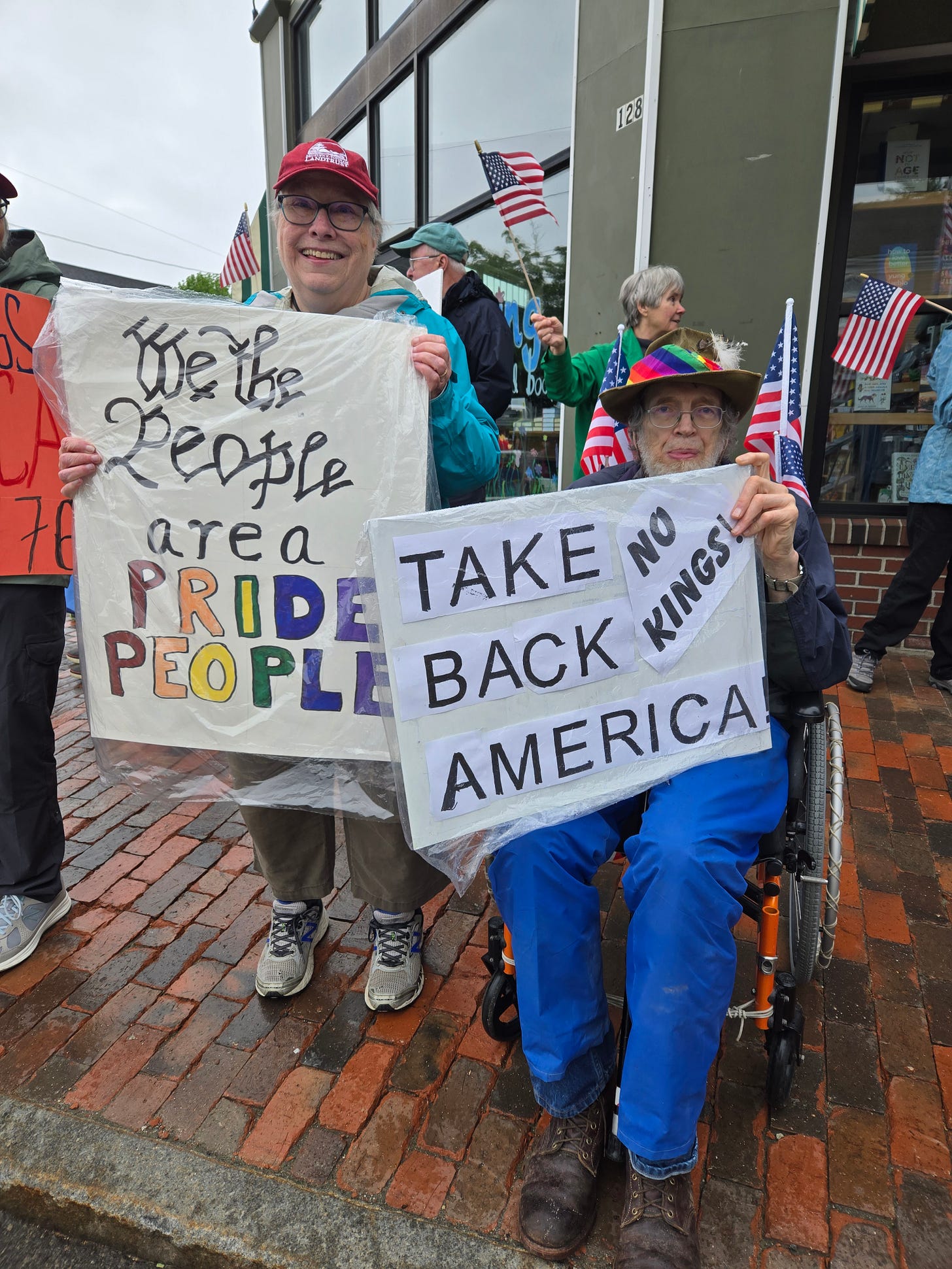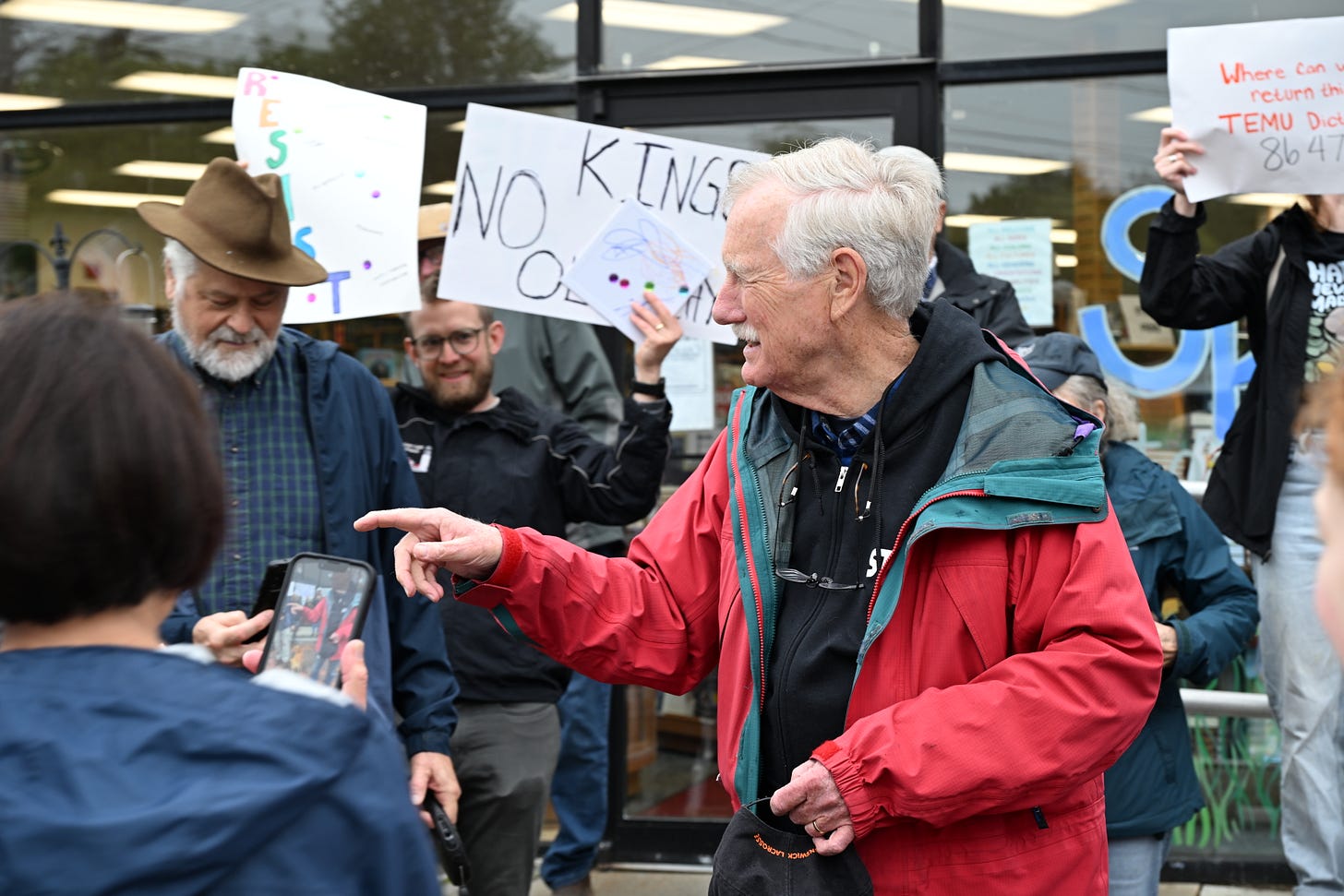Sly
“Everybody is a star.” — Sly Stone
“To suppress free speech is a double wrong. It violates the rights of the hearer as well as those of the speaker.” — Frederick Douglass
"Whoever would overthrow the liberty of a nation must begin by subduing the freeness of speech." ―Silence Dogood, likely pseudonym of Benjamin Franklin

People have been misspelling my name all my life: Slyvia. I think it must be the “y” that throws people off. Anyway, the misspelling has led to all kinds of funny nicknames, most notably Slyvia and Slyv and, somehow but I forget how, Filbert. (I am kind of nutty. Maybe that’s how.)
Through the years there have been other nicknames, too, of course, that have nothing to do with my name being misspelled and everything to do with circumstances. “Teapot,” for instance, came about because I happened to be making tea when someone visited me in my office. When most people give me a nickname, however, it’s, unsurprisingly, “Syl,” with the “y” properly placed. Sometimes I get called “Sylvie,” too, which is fun. I cherish the richness of those nicknames.
I thought of all those years of misspellings and nicknames when I read that Sly of Sly and the Family Stone had died. I had never thought much about his name before, but when he died, I read that his given name had been Sylvester. Apparently, he changed his name to Sly because everyone kept misspelling his name: Slyvester.
Well, duh! I could have predicted that!
Anyway, it turns out he was a kindred spirit in some ways. And not simply because he sang, “Everybody is a Star,” a song with a sweet message that I endorse. He also obviously faced the same name spelling issues I have faced my whole life long. That pesky “y” masquerading as a vowel!
All of that got me thinking about what it is like to be seen, really seen, for who you are. Truth told, I am unconcerned with the way people have misspelled my name through the years. I mean, really, who cares? Not me. What caught my attention was the fact that in all this time — to the best of my recollection — nobody, including me, ever thought to nickname me “Sly.” Interesting, huh? I’m assuming that’s because “sly” actually means something in English — “smart,” yes, but overlaid with a certain deceitful nature. That wouldn’t be me.
(Well, there was that one surprise birthday party our son and I planned for my husband a few years ago. I was pretty sly about that, and so was our son. It turns out I have a whole bunch of neighbors who are capable of being sly and devious, too. Who knew? All I can tell you is we pulled it off without a hitch. My husband was knock-him-over-with-a-feather surprised. So, I guess I have it in me. But, generally speaking, if you were describing me, I don’t think “sly” is the first word that would come to mind.)
“Sly like a fox,” is what people say when they want to paint someone as both smart and devious. It certainly isn’t a compliment. I don’t know where the expression originates, and, actually, I think it shines an unfairly bad light on such gorgeous animals. I really like foxes. I grieve that their population in my neck of the woods is being decimated by rabies. Red foxes have pretty much disappeared here now, and they have been replaced with gray foxes. The gray foxes are beautiful, too, but I miss seeing the red fox’s coppery coat and plumy tail.
Are foxes sly? Which is to say intelligent in a deceitful sort of way? I wouldn’t call them that. They are predators, so they have to be somewhat sneaky so that they can catch their prey. But that’s just how they move through the natural world. Calling them “sly” anthropomorphizes them in a way that I don’t think is helpful to them. Moreover, looking at them that way prevents us from seeing them in their true fox-like nature. That is the way of stereotypes: They allow us to see only what we want to see; they prevent us from seeing what is real.
And what is real anyway? These days it seems to me I have to cut through an awful lot of nonsense to understand what is really going on in the world around me. I think of all those misspellings of my name — all of them unintentional — and they pale in comparison to the intentional blurring of the facts and the blatant lies people spread because — well, because they like some version of reality that is different from what is actually true.
“Alternative facts,” Kellyanne Conway once called the blurring of facts that didn’t support her viewpoint. As I recall, that was in 2016, during Donald Trump’s first presidential campaign. Even the term “alternative facts” failed to use accurate, truthful language to describe what they actually are, which is to say: lies.
Here’s an example of what I mean: At a press conference in Los Angeles on June 12, Homeland Security Secretary Kristi Noem made this statement:
“We are not going away. We are staying here to liberate this city from the socialist and the burdensome leadership that this governor and this mayor have placed on this country and what they have tried to insert into this city.”
There are so many things horribly wrong with her statement. Mayor Karen Bass and Governor Gavin Newsom are duly elected leaders. Are they socialists? To be honest, I haven’t read the political treatises of either one of them. But, even if they are socialists, so what? The people of Los Angeles and California have every right to elect whoever they want to public office. The whole idea that the Trump administration sees itself as “liberating” people from their own elected leaders is repugnant and chilling.
That’s what I mean about manufacturing some version of reality that is different from what is actually true. Only in some alternate universe, where facts are cast aside to suit one’s agenda, is it okay for the federal government to wrest political control from a state’s rightfully elected leaders.
I thought about that sort of thing a lot as I prepared for, then participated in, No Kings Day on June 14. I grieve so much of what has been lost during the Trump administration. So much that is important to me is at risk or has even apparently already cratered: the social safety net that protects children, the poor, the infirmed, the elderly. Science and research (who would have ever guessed vaccinations would be at risk in this country? Or cancer research?). NOAA and national parks and funding for HIV/AIDS treatment in impoverished countries around the world. NATO. Allies. DEI. Funding for libraries and public education and public broadcasting. Environmental care. And so much more.
I already miss having my personal information kept private. I miss due process — and respect for the law overall. I miss basic common sense. I miss human decency. Compassion. Caring.
I miss honesty and truth telling. And I miss having faith that our president and those in his orbit respect and work to defend democracy, our United States Constitution, and freedom.
That’s why I participated in a rally in Freeport, Maine, on No Kings Day.
Here in Maine, we rallied in a light rain, but a little moisture didn’t seem to dampen anyone’s spirits. Around 2000 people gathered in Freeport, stretching along Main Street for several blocks, starting at Maine’s iconic L.L. Bean flagship store. (There were other rallies in Maine as well, several of them larger than the one in Freeport.) Lots of cars honked in solidarity as they sailed by. Lots of drivers and their passengers waved at us. If there were negative responses (and I assume there must have been), I didn’t see them.
Here’s my one good thing: There on the streets of one American town — a fairly small town if you want the truth — people gathered together to express their convictions. Yes, it is a good thing we still are able to do that in America — and may that continue to be the case. And it was a wonderful thing to feel as though I wasn’t alone with my distress. I wasn’t alone with my love and grief for a country that seems to be vanishing before my eyes. I wasn’t alone with my sense that by banding together we might be able to make a difference. I wasn’t alone.
Was I visible? As an individual, no, certainly not. But, across the nation, millions gathered, drawn by the same convictions and concerns, compelled by the same love for their country and hope they could make a difference. That tide was absolutely visible.
I keep hearing people say that the most powerful person in America is you (or me), the voter. Our Constitution begins with the words, “We the People,” conveying the new and radical (at the time) notion that the people themselves are free to choose those who govern them. Freedom is so important to me — that we have the opportunity to grow and learn and think for ourselves, that we have the liberty to speak our minds, that we get to elect our leaders (or even choose to run for office so that we can be leaders ourselves), that we have the opportunity to grow into our own true and full being.
Sylvester Stone’s solution to the problem of having people constantly misspell his name was to change his name: Sly. That was clever. And Sly Stone made a good stage name, too. Me, I’ve waved off the spelling errors as inconsequential, and I’ve enjoyed a lifetime of really good nicknames. Call me what you want. The only thing that really matters to me is that you see me for who I am, that you allow me to express myself even when you disagree with me, that you give me the basic freedom to live into my own true being. I will do the same for you.
Love,
Sly







Hi Sylvia. I so agree with you. I love the photos too. This was an outstanding column. You could repost it everyday. Thanks for being you and telling your truth. Hugs. Carol McCoy
Thank you, thank you, thank you! Your words are balm for a confused, pessimistic, tired old brain.